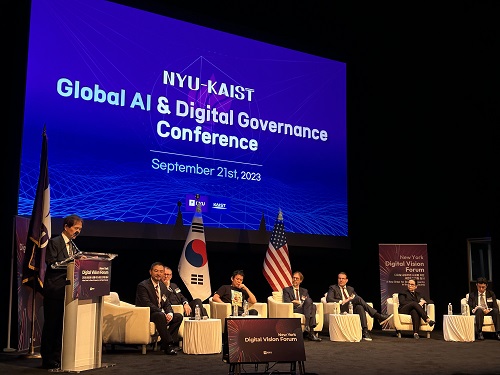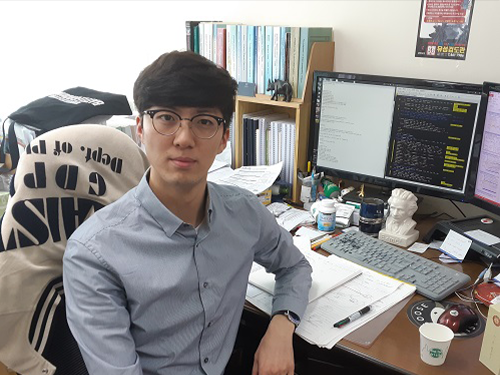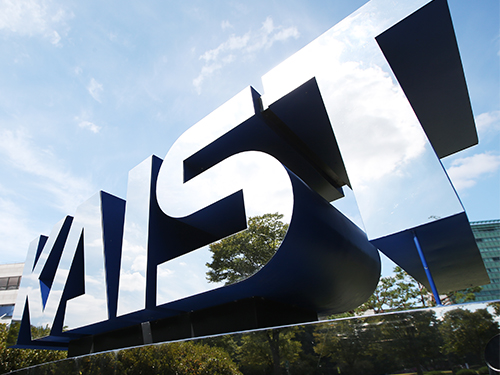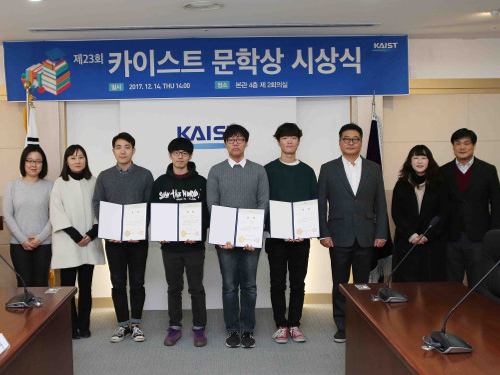ITER
-
 NYU-KAIST Global AI & Digital Governance Conference Held
< Photo 1. Opening of NYU-KAIST Global AI & Digital Governance Conference >
In attendance of the Minister of Science and ICT Jong-ho Lee, NYU President Linda G. Mills, and KAIST President Kwang Hyung Lee, KAIST co-hosted the NYU-KAIST Global AI & Digital Governance Conference at the Paulson Center of New York University (NYU) in New York City, USA on September 21st, 9:30 pm.
At the conference, KAIST and NYU discussed the direction and policies for ‘global AI and digital governance’ with participants of upto 300 people which includes scholars, professors, and students involved in the academic field of AI and digitalization from both Korea and the United States and other international backgrounds. This conference was a forum of an international discussion that sought new directions for AI and digital technology take in the future and gathered consensus on regulations.
Following a welcoming address by KAIST President, Kwang Hyung Lee and a congratulatory message from the Minister of Science and ICT, Jong-ho Lee, a panel discussion was held, moderated by Professor Matthew Liao, a graduate of Princeton and Oxford University, currently serving as a professor at NYU and the director at the Center for Bioethics of the NYU School of Global Public Health.
Six prominent scholars took part in the panel discussion. Prof. Kyung-hyun Cho of NYU Applied Mathematics and Data Science Center, a KAIST graduate who has joined the ranks of the world-class in AI language models and Professor Jong Chul Ye, the Director of Promotion Council for Digital Health at KAIST, who is leading innovative research in the field of medical AI working in collaboration with major hospitals at home and abroad was on the panel. Additionally, Professor Luciano Floridi, a founding member of the Yale University Center for Digital Ethics, Professor Shannon Vallor, the Baillie Gifford Professor in the Ethics of Data and Artificial Intelligence at the University of Edinburgh of the UK, Professor Stefaan Verhulst, a Co-Founder and the DIrector of GovLab‘s Data Program at NYU’s Tandon School of Engineering, and Professor Urs Gasser, who is in charge of public policy, governance and innovative technology at the Technical University of Munich, also participated.
Professor Matthew Liao from NYU led the discussion on various topics such as the ways to to regulate AI and digital technologies; the concerns about how deep learning technology being developed in medicinal purposes could be used in warfare; the scope of responsibilities Al scientists' responsibility should carry in ensuring the usage of AI are limited to benign purposes only; the effects of external regulation on the AI model developers and the research they pursue; and on the lessons that can be learned from the regulations in other fields.
During the panel discussion, there was an exchange of ideas about a system of standards that could harmonize digital development and regulatory and social ethics in today’s situation in which digital transformation accelerates technological development at a global level, there is a looming concern that while such advancements are bringing economic vitality it may create digital divides and probles like manipulation of public opinion. Professor Jong-cheol Ye of KAIST (Director of the Promotion Council for Digital Health), in particular, emphasized that it is important to find a point of balance that does not hinder the advancements rather than opting to enforcing strict regulations.
< Photo 2. Panel Discussion in Session at NYU-KAIST Global AI & Digital Governance Conference >
KAIST President Kwang Hyung Lee explained, “At the Digital Governance Forum we had last October, we focused on exploring new governance to solve digital challenges in the time of global digital transition, and this year’s main focus was on regulations.”
“This conference served as an opportunity of immense value as we came to understand that appropriate regulations can be a motivation to spur further developments rather than a hurdle when it comes to technological advancements, and that it is important for us to clearly understand artificial intelligence and consider what should and can be regulated when we are to set regulations on artificial intelligence,” he continued.
Earlier, KAIST signed a cooperation agreement with NYU to build a joint campus, June last year and held a plaque presentation ceremony for the KAIST NYU Joint Campus last September to promote joint research between the two universities. KAIST is currently conducting joint research with NYU in nine fields, including AI and digital research. The KAIST-NYU Joint Campus was conceived with the goal of building an innovative sandbox campus centering aroung science, technology, engineering, and mathematics (STEM) combining NYU's excellent humanities and arts as well as basic science and convergence research capabilities with KAIST's science and technology.
KAIST has contributed to the development of Korea's industry and economy through technological innovation aiding in the nation’s transformation into an innovative nation with scientific and technological prowess. KAIST will now pursue an anchor/base strategy to raise KAIST's awareness in New York through the NYU Joint Campus by establishing a KAIST campus within the campus of NYU, the heart of New York.
2023.09.22 View 9535
NYU-KAIST Global AI & Digital Governance Conference Held
< Photo 1. Opening of NYU-KAIST Global AI & Digital Governance Conference >
In attendance of the Minister of Science and ICT Jong-ho Lee, NYU President Linda G. Mills, and KAIST President Kwang Hyung Lee, KAIST co-hosted the NYU-KAIST Global AI & Digital Governance Conference at the Paulson Center of New York University (NYU) in New York City, USA on September 21st, 9:30 pm.
At the conference, KAIST and NYU discussed the direction and policies for ‘global AI and digital governance’ with participants of upto 300 people which includes scholars, professors, and students involved in the academic field of AI and digitalization from both Korea and the United States and other international backgrounds. This conference was a forum of an international discussion that sought new directions for AI and digital technology take in the future and gathered consensus on regulations.
Following a welcoming address by KAIST President, Kwang Hyung Lee and a congratulatory message from the Minister of Science and ICT, Jong-ho Lee, a panel discussion was held, moderated by Professor Matthew Liao, a graduate of Princeton and Oxford University, currently serving as a professor at NYU and the director at the Center for Bioethics of the NYU School of Global Public Health.
Six prominent scholars took part in the panel discussion. Prof. Kyung-hyun Cho of NYU Applied Mathematics and Data Science Center, a KAIST graduate who has joined the ranks of the world-class in AI language models and Professor Jong Chul Ye, the Director of Promotion Council for Digital Health at KAIST, who is leading innovative research in the field of medical AI working in collaboration with major hospitals at home and abroad was on the panel. Additionally, Professor Luciano Floridi, a founding member of the Yale University Center for Digital Ethics, Professor Shannon Vallor, the Baillie Gifford Professor in the Ethics of Data and Artificial Intelligence at the University of Edinburgh of the UK, Professor Stefaan Verhulst, a Co-Founder and the DIrector of GovLab‘s Data Program at NYU’s Tandon School of Engineering, and Professor Urs Gasser, who is in charge of public policy, governance and innovative technology at the Technical University of Munich, also participated.
Professor Matthew Liao from NYU led the discussion on various topics such as the ways to to regulate AI and digital technologies; the concerns about how deep learning technology being developed in medicinal purposes could be used in warfare; the scope of responsibilities Al scientists' responsibility should carry in ensuring the usage of AI are limited to benign purposes only; the effects of external regulation on the AI model developers and the research they pursue; and on the lessons that can be learned from the regulations in other fields.
During the panel discussion, there was an exchange of ideas about a system of standards that could harmonize digital development and regulatory and social ethics in today’s situation in which digital transformation accelerates technological development at a global level, there is a looming concern that while such advancements are bringing economic vitality it may create digital divides and probles like manipulation of public opinion. Professor Jong-cheol Ye of KAIST (Director of the Promotion Council for Digital Health), in particular, emphasized that it is important to find a point of balance that does not hinder the advancements rather than opting to enforcing strict regulations.
< Photo 2. Panel Discussion in Session at NYU-KAIST Global AI & Digital Governance Conference >
KAIST President Kwang Hyung Lee explained, “At the Digital Governance Forum we had last October, we focused on exploring new governance to solve digital challenges in the time of global digital transition, and this year’s main focus was on regulations.”
“This conference served as an opportunity of immense value as we came to understand that appropriate regulations can be a motivation to spur further developments rather than a hurdle when it comes to technological advancements, and that it is important for us to clearly understand artificial intelligence and consider what should and can be regulated when we are to set regulations on artificial intelligence,” he continued.
Earlier, KAIST signed a cooperation agreement with NYU to build a joint campus, June last year and held a plaque presentation ceremony for the KAIST NYU Joint Campus last September to promote joint research between the two universities. KAIST is currently conducting joint research with NYU in nine fields, including AI and digital research. The KAIST-NYU Joint Campus was conceived with the goal of building an innovative sandbox campus centering aroung science, technology, engineering, and mathematics (STEM) combining NYU's excellent humanities and arts as well as basic science and convergence research capabilities with KAIST's science and technology.
KAIST has contributed to the development of Korea's industry and economy through technological innovation aiding in the nation’s transformation into an innovative nation with scientific and technological prowess. KAIST will now pursue an anchor/base strategy to raise KAIST's awareness in New York through the NYU Joint Campus by establishing a KAIST campus within the campus of NYU, the heart of New York.
2023.09.22 View 9535 -
 Park Chosen for Principality of Monaco/ITER Postdoctoral Fellowship
(Jaesun Park in the Integrated Master's and Doctoral Degree Program )
Jaesun Park from the Department of Physics, was selected as a Principality of Monaco/ITER Postdoctoral Fellowship recipient.
This program was established by the Principality of Monaco and an international organization, ITER, in January 2008 to support postdoctoral researchers who will be working for ITER. It is a relatively competitive program because it chooses only five people every two years.
The selected postdoctoral researchers will be working for ITER for two years while conducting research projects with outstanding researchers in the field of nuclear fusion.
ITER, one of the most ambitious energy projects, was launched in 1985 with the purpose of carrying out joint research on nuclear fusion energy. Currently, about 800 people are working for this organization.
Seven ITER member countries (i.e. Korea, the European Union, the United States, China, Japan, Russia, and India) are sharing the expenses and engaging in mega-scale science projects. Korea shares 9.1% (20 billion Euro) of the total construction costs of ITER experimental devices.
Park will begin his duties in early 2019.
2018.05.04 View 9385
Park Chosen for Principality of Monaco/ITER Postdoctoral Fellowship
(Jaesun Park in the Integrated Master's and Doctoral Degree Program )
Jaesun Park from the Department of Physics, was selected as a Principality of Monaco/ITER Postdoctoral Fellowship recipient.
This program was established by the Principality of Monaco and an international organization, ITER, in January 2008 to support postdoctoral researchers who will be working for ITER. It is a relatively competitive program because it chooses only five people every two years.
The selected postdoctoral researchers will be working for ITER for two years while conducting research projects with outstanding researchers in the field of nuclear fusion.
ITER, one of the most ambitious energy projects, was launched in 1985 with the purpose of carrying out joint research on nuclear fusion energy. Currently, about 800 people are working for this organization.
Seven ITER member countries (i.e. Korea, the European Union, the United States, China, Japan, Russia, and India) are sharing the expenses and engaging in mega-scale science projects. Korea shares 9.1% (20 billion Euro) of the total construction costs of ITER experimental devices.
Park will begin his duties in early 2019.
2018.05.04 View 9385 -
 The 22nd Humanistic Education Opens to Daejeon Citizens
The KAIST Research Center for Humanities and Social Sciences will open up the 22nd Humanistic Education for Citizens every week from March 21 to April 25.
People can apply for this program through its website (http://hss.kaist.ac.kr), starting from March 12. Anyone living in Daejeon can participate in this program at no charge but the program is limited to 100 participants on a first-come, first-serve basis.
KAIST Humanistic Education for Citizens was established in 2012 and is held four times during a year to reinforce bonding with local citizens and enhance cultural refinement and an appreciation of literature.
With the topic ‘Are News Facts?” the seminar has invited six lecturers, including Researcher Soo Young Kim from the Institute of Communication Research, to navigate various issues that smart news users need to know in this era of massive news consumption.
The lecture is dedicated to discussing a current hot issue, the phenomenon of fake news, from various perspectives and to promote smart news consumption.
It will also help to provide an understanding of legal and policy changes regarding media production and distribution.
Professor Donghwan Ko, who is also the dean of the School of Humanities and Social Sciences said, “The lectures will provide information on various issues that people need to know more about for smart news consumption in the “infoglut” era from media, psychological, social, and legal perspectives.”
The lectures will be held every Wednesday at 3pm in the School of Humanities and Social Sciences.
2018.03.06 View 6131
The 22nd Humanistic Education Opens to Daejeon Citizens
The KAIST Research Center for Humanities and Social Sciences will open up the 22nd Humanistic Education for Citizens every week from March 21 to April 25.
People can apply for this program through its website (http://hss.kaist.ac.kr), starting from March 12. Anyone living in Daejeon can participate in this program at no charge but the program is limited to 100 participants on a first-come, first-serve basis.
KAIST Humanistic Education for Citizens was established in 2012 and is held four times during a year to reinforce bonding with local citizens and enhance cultural refinement and an appreciation of literature.
With the topic ‘Are News Facts?” the seminar has invited six lecturers, including Researcher Soo Young Kim from the Institute of Communication Research, to navigate various issues that smart news users need to know in this era of massive news consumption.
The lecture is dedicated to discussing a current hot issue, the phenomenon of fake news, from various perspectives and to promote smart news consumption.
It will also help to provide an understanding of legal and policy changes regarding media production and distribution.
Professor Donghwan Ko, who is also the dean of the School of Humanities and Social Sciences said, “The lectures will provide information on various issues that people need to know more about for smart news consumption in the “infoglut” era from media, psychological, social, and legal perspectives.”
The lectures will be held every Wednesday at 3pm in the School of Humanities and Social Sciences.
2018.03.06 View 6131 -
 A Glance at the 2017 KAIST Literary Awards Ceremony
Since KAIST is a university specializing in science and engineering, people may think that the students rarely engage in literary activities. But KAIST students also excel in writing literature.
The 23rd KAIST Literary Award Ceremony was held on December 14 on the KAIST main campus. The award was established in 1995 to encourage students’ creative activities and to promote literary attainment. It is open to all KAIST students from undergraduate to masters and PhD students. This year, 43 students submitted a total of 68 literary works in the genres of poetry, novel, critique, and scenario.
KAIST professors Dong Ju Kim, Bong Gwan Jun, and Yunjeong Jo from the School of Humanities & Social Sciences participated as judges for the awards and they were joined by writers from the 8th Endless Road Program who served as invited judges for the novels and scenarios.
The Endless Road Program is a KAIST project for supporting artists who are engaged in literary works including scenarios, novels, webtoons, and movies by providing residences and funds. Novelists Jin Young Choi and Hak Chan Kim participated as judges for the novels and a drama scriptwriter, Joo Kim, as a judge of the scenarios.
After thorough evaluation, four submissions were chosen as awardees.
Section
Award
Name
Poetry
Winner
Sung Gil Moon (PhD candidate from the College of Business)
Runner-up
Jong Ik Jeon (Undergraduate student)
Novel
Winner
Joo Hwan Kim
(Undergraduate from the Dept. of Chemical and Biomolecular Engineering)
Runner-up
-
Essay & Critique
Winner
-
Runner-up
Jung Joon Park
(PhD candidate from the Dept. of Bio and Brain Engineering)
Scenario
Winner
-
Runner-up
-
The literary works as well as a review of the awards will be published in the KAIST Times in 2018.
2017.12.15 View 8161
A Glance at the 2017 KAIST Literary Awards Ceremony
Since KAIST is a university specializing in science and engineering, people may think that the students rarely engage in literary activities. But KAIST students also excel in writing literature.
The 23rd KAIST Literary Award Ceremony was held on December 14 on the KAIST main campus. The award was established in 1995 to encourage students’ creative activities and to promote literary attainment. It is open to all KAIST students from undergraduate to masters and PhD students. This year, 43 students submitted a total of 68 literary works in the genres of poetry, novel, critique, and scenario.
KAIST professors Dong Ju Kim, Bong Gwan Jun, and Yunjeong Jo from the School of Humanities & Social Sciences participated as judges for the awards and they were joined by writers from the 8th Endless Road Program who served as invited judges for the novels and scenarios.
The Endless Road Program is a KAIST project for supporting artists who are engaged in literary works including scenarios, novels, webtoons, and movies by providing residences and funds. Novelists Jin Young Choi and Hak Chan Kim participated as judges for the novels and a drama scriptwriter, Joo Kim, as a judge of the scenarios.
After thorough evaluation, four submissions were chosen as awardees.
Section
Award
Name
Poetry
Winner
Sung Gil Moon (PhD candidate from the College of Business)
Runner-up
Jong Ik Jeon (Undergraduate student)
Novel
Winner
Joo Hwan Kim
(Undergraduate from the Dept. of Chemical and Biomolecular Engineering)
Runner-up
-
Essay & Critique
Winner
-
Runner-up
Jung Joon Park
(PhD candidate from the Dept. of Bio and Brain Engineering)
Scenario
Winner
-
Runner-up
-
The literary works as well as a review of the awards will be published in the KAIST Times in 2018.
2017.12.15 View 8161 -
 Jinkon Chung won gold prize at 'Intel student paper contest'
Jinkon Chung won gold prize at ‘Intel student paper contest’
Jinkon Chung, doctorate student at the Division of Electrical Engineering under Professor Yonghoon Lee’s supervisory, won the gold prize at ‘the student paper contest 2006’ organized by Intel Korea.
Chung proposed an important key for the next-generation mobile communication technologies at his paper entitled with ‘Regularized channel diagonalization for multi-user MIMO downlink using a modified MMSE criterion’.
That is a new linear processing algorithm showing superior performances to the existing ZF-based or MMSC-based methods under the circumference of multi-user MIMO, which is the most spotlighted field in the recent next-generation mobile communication technologies, which was highly evaluated in the contest.
Meanwhile, Howon Lee and Sunghoon Lim, Division of Electrical Engineering, also won bronze prizes.
2006.11.27 View 14409
Jinkon Chung won gold prize at 'Intel student paper contest'
Jinkon Chung won gold prize at ‘Intel student paper contest’
Jinkon Chung, doctorate student at the Division of Electrical Engineering under Professor Yonghoon Lee’s supervisory, won the gold prize at ‘the student paper contest 2006’ organized by Intel Korea.
Chung proposed an important key for the next-generation mobile communication technologies at his paper entitled with ‘Regularized channel diagonalization for multi-user MIMO downlink using a modified MMSE criterion’.
That is a new linear processing algorithm showing superior performances to the existing ZF-based or MMSC-based methods under the circumference of multi-user MIMO, which is the most spotlighted field in the recent next-generation mobile communication technologies, which was highly evaluated in the contest.
Meanwhile, Howon Lee and Sunghoon Lim, Division of Electrical Engineering, also won bronze prizes.
2006.11.27 View 14409